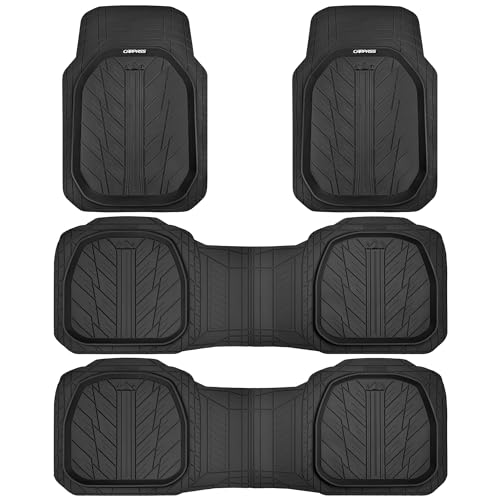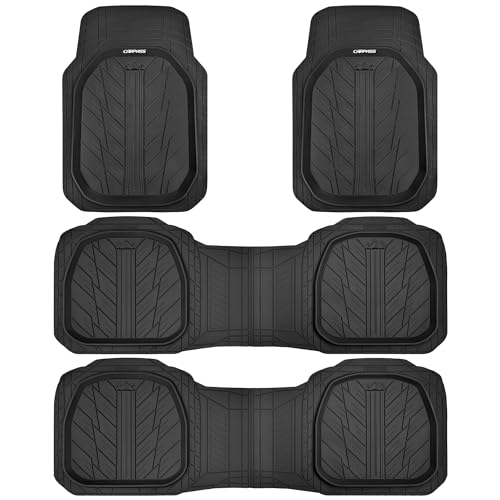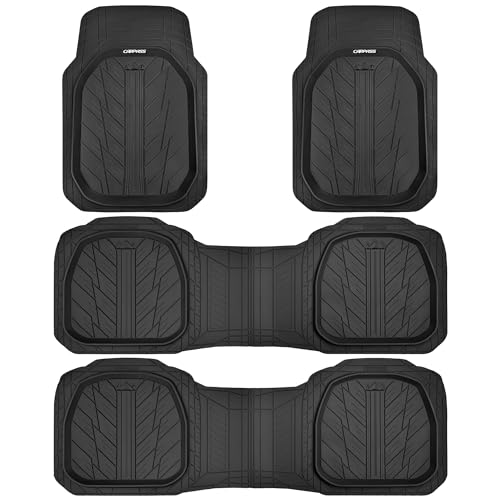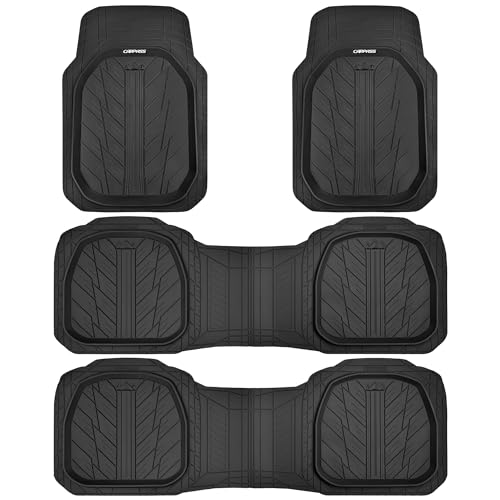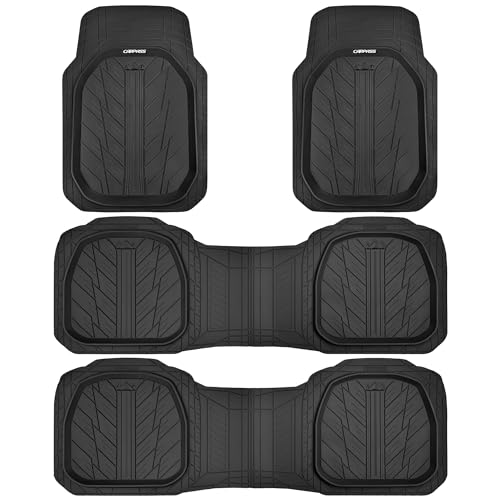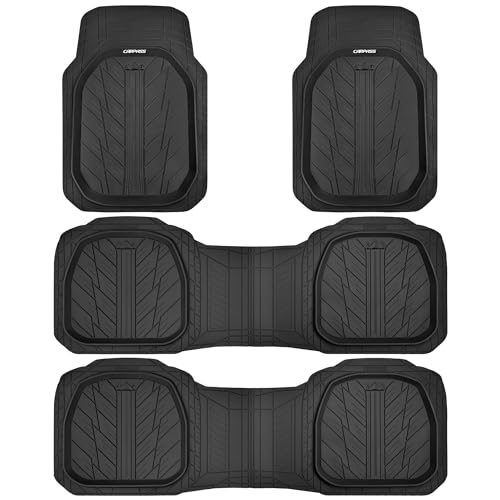Remember that stressful family road trip last summer? Cramped quarters, questionable legroom, and a constant battle over the air conditioning? This year, let’s avoid the drama. This guide will help you answer the question: what is the best SUV for 2025? We’ll explore top contenders, comparing features, safety ratings, and fuel efficiency to help you find the perfect family vehicle. By the end, you’ll be confident in choosing the SUV that best fits your lifestyle and budget.
Key Takeaways
- Discover the top-rated SUVs for 2025.
- Compare safety features, fuel efficiency, and pricing across different models.
- Understand the key factors to consider when choosing an SUV.
- Learn about the latest advancements in SUV technology.
- Find the perfect SUV to match your needs and budget.
Choosing the Right SUV for Your Needs
This section dives into the crucial factors to consider when selecting an SUV for 2025. We’ll examine aspects like passenger capacity, cargo space, fuel economy, and safety features, helping you narrow down your choices based on your specific requirements. Understanding these factors is key to finding what is the best SUV for 2025 for *you*.
Passenger Capacity and Cargo Space
Family size and lifestyle greatly influence your SUV needs. Do you need three rows of seating for a large family, or will two rows suffice? Consider cargo space for everyday items, weekend getaways, or hauling larger items. Many SUVs offer configurable seating and cargo options, allowing you to adjust the space based on your current needs. For example, some SUVs feature fold-flat second and third-row seats, maximizing cargo space when needed.
- Large Families: Three-row SUVs like the Honda Pilot or Kia Telluride are ideal, offering ample seating and cargo space.
- Smaller Families/Couples: Two-row SUVs like the Mazda CX-5 or Subaru Forester provide excellent space efficiency without the bulk of larger models.
Fuel Efficiency and Engine Performance
Fuel economy is a significant consideration for many SUV buyers. Hybrid and electric options are becoming increasingly popular, offering lower running costs and a smaller carbon footprint. However, different engines provide different levels of power and performance. Consider how much towing you might need to do, or if you regularly drive in demanding conditions. The right balance of fuel economy and power will depend heavily on your usage.
- Hybrid SUVs: Toyota RAV4 Hybrid and Hyundai Tucson Hybrid are popular choices, known for their impressive fuel efficiency.
- Electric SUVs: Tesla Model Y and Ford Mustang Mach-E offer powerful performance and zero tailpipe emissions, but range and charging infrastructure need to be considered.
Safety Features and Technology
Safety is paramount, especially when transporting a family. Look for advanced driver-assistance systems (ADAS) like automatic emergency braking, lane departure warning, blind-spot monitoring, and adaptive cruise control. These features significantly improve safety and can help avoid accidents. Many 2025 models boast advanced safety technology and top safety ratings from organizations like the IIHS and NHTSA.
- Advanced Driver-Assistance Systems (ADAS): Features such as adaptive cruise control and automatic emergency braking are becoming increasingly standard in modern SUVs.
- Safety Ratings: Check the safety ratings from the IIHS (Insurance Institute for Highway Safety) and NHTSA (National Highway Traffic Safety Administration) before making a decision.
Top SUV Contenders for 2025
This section showcases some of the leading SUV models expected to be popular in 2025. We’ll provide a brief overview of their key features and specifications to aid your decision-making process. Remember to test drive any models you’re considering to get a feel for their handling and comfort.
Luxury SUVs
Luxury SUVs offer premium features, advanced technology, and refined driving experiences. However, they typically come with a higher price tag. This segment often leads in safety technology and innovative features.
- BMW X5: Known for its sporty handling and luxurious interior.
- Mercedes-Benz GLE-Class: Offers a sophisticated and comfortable ride with advanced technology features.
- Audi Q7: Combines luxury with practicality, featuring spacious interiors and a powerful engine lineup.
Mid-Size SUVs
Mid-size SUVs provide a balance between passenger space, cargo capacity, and fuel efficiency, making them a popular choice for many families. They often strike a balance between price and luxury. The competition is fierce in this category, making research crucial.
- Honda CR-V: Reliable, fuel-efficient, and packed with features.
- Toyota RAV4: A long-standing favorite known for its reliability and resale value. Hybrid variants offer exceptional fuel economy.
- Mazda CX-5: Appeals to drivers who value driving dynamics and a stylish design.
Compact SUVs
Compact SUVs offer great maneuverability and fuel efficiency, making them ideal for city driving and smaller families. Despite their smaller size, many offer surprisingly spacious interiors and impressive cargo capacity, perfect for everyday use.
- Subaru Crosstrek: Known for its all-wheel drive and rugged capability.
- Hyundai Kona: Offers a blend of style, technology, and affordability.
- Kia Seltos: Provides good value for money with plenty of features.
Comparative Analysis: Top 3 SUVs
Let’s compare three leading SUVs across key metrics to help you visualize the differences. Insert a comparison chart here (comparing features like fuel efficiency, safety ratings, pricing, and cargo space for three specific models). Consider using a visually appealing chart that’s easily readable and understandable.
| Feature | Honda CRV | Toyota RAV4 | Mazda CX-5 |
|---|---|---|---|
| Fuel Efficiency (City/Highway MPG) | 28/34 (estimated) | 28/35 (estimated) | 24/31 (estimated) |
| Cargo Space (Cubic Feet) | 39.2 | 37.6 | 31.0 |
| Starting Price (USD) | $28,000 (estimated) | $27,500 (estimated) | $27,000 (estimated) |
| IIHS Overall Safety Rating | Top Safety Pick+ (estimated) | Top Safety Pick+ (estimated) | Top Safety Pick+ (estimated) |
Note: These are estimated values and can vary based on the trim level and year.
Debunking Common Myths about SUVs
Myth 1: All SUVs are Gas Guzzlers
While some large SUVs can have lower fuel economy, many compact and mid-size SUVs, especially hybrids and electric models, offer excellent fuel efficiency, comparable to smaller cars. Advances in engine technology and hybrid powertrains are constantly improving fuel economy in this sector.
Myth 2: SUVs Are Only For Families
While SUVs are popular with families, they offer versatility that appeals to a wide range of lifestyles. Individuals and couples may appreciate the extra space for gear, pets, or hobbies. The increased ground clearance can also be beneficial for off-road adventures.
Myth 3: All SUVs are Expensive
The price range for SUVs varies significantly, from affordable compact SUVs to luxury models with high price tags. There’s an SUV to suit every budget, making them accessible to a broader range of buyers.
Step-by-Step Guide: Choosing Your 2025 SUV
- Define Your Needs: Consider family size, cargo needs, driving style, and budget.
- Research Models: Explore different SUVs within your budget and needs, reading reviews and comparing specifications.
- Compare Features: Use comparison tools and charts to analyze safety ratings, fuel economy, and technology features.
- Test Drive: Test drive multiple models to experience their handling, comfort, and features firsthand.
- Finalize Your Decision: Based on your research and test drives, choose the SUV that best fits your requirements and budget.
Real-Life Case Studies
Case Study 1: The Johnson Family, with three children and an active lifestyle, opted for a three-row SUV offering ample cargo space for sporting equipment and family vacations. They prioritized safety features and fuel efficiency. Their choice: a Honda Pilot.
Case Study 2: Sarah, a single professional, prioritized fuel efficiency and city maneuverability. She chose a compact SUV, the Hyundai Kona, balancing style and practicality.
Case Study 3: The Miller family, who frequently tow a boat, required a powerful SUV with a high towing capacity. They chose a larger SUV with a robust engine to meet their needs.
Frequently Asked Questions
What is the average price range for SUVs in 2025?
The price range varies greatly depending on the size, features, and brand. Expect a wide range, from around $25,000 for compact SUVs to well over $75,000 for luxury models. Hybrid and electric SUVs may also have a higher initial cost but could potentially offer long-term savings on fuel.
What are the most important safety features to look for?
Prioritize features like automatic emergency braking, lane departure warning, blind-spot monitoring, and adaptive cruise control. Also, check the safety ratings from organizations like the IIHS and NHTSA. These organizations provide independent testing and ratings based on safety performance.
How does fuel efficiency vary between different SUV types?
Fuel efficiency significantly varies depending on the size and engine type. Compact and hybrid SUVs generally offer better fuel economy than larger gas-powered models. Electric SUVs offer zero tailpipe emissions but range can vary depending on battery size and driving conditions. Always check the EPA’s estimated MPG ratings.
What are the benefits of a three-row SUV?
Three-row SUVs provide extra passenger capacity, perfect for larger families. They usually offer more cargo space, making them suitable for families with children or those who frequently transport bulky items. However, they are generally larger, impacting fuel economy and maneuverability in city environments.
What is the difference between AWD and 4WD?
All-wheel drive (AWD) systems typically distribute power to all four wheels continuously for improved traction. Four-wheel drive (4WD) systems often have a high and low range, providing better off-road capabilities but can be less efficient on paved roads. The best choice depends on your driving conditions and needs.
Are electric SUVs a good option in 2025?
Electric SUVs are increasingly popular, offering zero tailpipe emissions and often impressive performance. However, factors such as range, charging infrastructure availability, and higher initial cost should be considered. The availability of charging stations along your regular routes will strongly influence the practical use of an electric SUV.
What should I do before buying an SUV?
Thoroughly research different models, comparing features, safety ratings, and fuel economy. Read reviews from other owners and, most importantly, test drive several models to determine which one best fits your driving style and needs. Don’t rush the process; take your time to make an informed decision.
Final Thoughts
Choosing the best SUV for 2025 requires careful consideration of various factors. By understanding your needs, researching available models, and comparing features, you can confidently select a vehicle that meets your lifestyle and budget. Remember to prioritize safety, fuel efficiency, and features that enhance your driving experience. Start your search today and find the perfect SUV to make your next road trip a memorable one!

